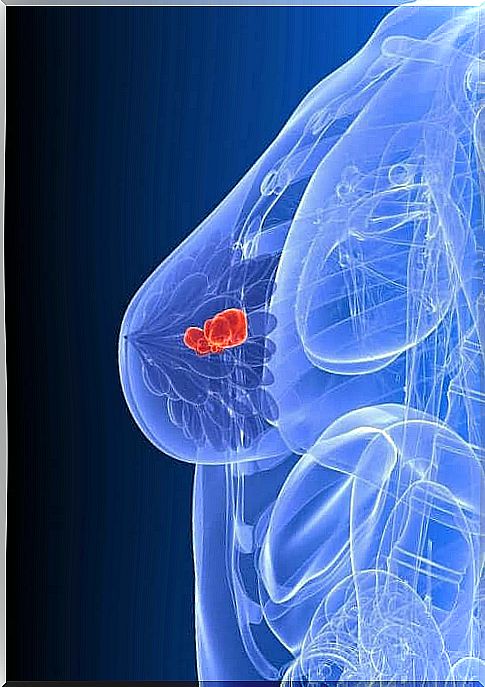BRCA1 And BRCA2 Genes And Breast Cancer

The BRCA1 and BRCA2 genes are a pair of human genes that produce proteins whose job is to try to suppress tumor growth. The proteins encoded by these two genes thus help to repair damaged DNA and are responsible for ensuring the stability of the genetic material in each cell.
Like all genetic material, the BRCA1 and BRCA2 genes can suffer from various mutations or alterations so that their structure is altered and inactivated. When this happens, they will no longer be able to encode and synthesize the protein needed to repair the DNA.
As a result, cells are more susceptible to genetic changes that can lead to cancer. Mutations in these genes, in particular, increase the risk of breast and ovarian cancer.
BRCA1 and BRCA2 genes and triple-negative breast cancer
Triple-negative breast cancer is a breast tumor that does not have any of the receptors typical of breast cancer. Thus, progesterone, estrogen, and HER2 receptors are not overexpressed. The prognosis for this type of cancer is currently one of the worst, as chemotherapy is actually the only treatment option.
Triple-negative breast cancer accounts for about 12-17% of all breast cancer cases. It spreads quickly and easily creates metastases. This and its difficult treatment are the reason for its poor prognosis.
One of the most common molecular events in these tumors is a change in the function of the BRCA protein. More than 80% of breast cancer patients with a hereditary BRCA1 mutation have triple-negative breast cancer. An estimated 15% of patients with ovarian cancer and 5% of patients with breast, pancreatic or prostate cancer have an inherited BRCA1 or BRCA2 gene mutation.

Treatment of triple-negative breast cancer involving a mutation in the BRCA1 and BRCA2 genes
In December 2014, olaparib was authorized as monotherapy for the treatment of advanced ovarian cancer involving a mutation in these genes. From these results, the researchers analyzed the effectiveness of this drug in treating advanced breast cancer in previously treated patients with mutations in the BRCA1 and BRCA2 genes.
At the highest tolerated dose of olaparib (400 mg every 12 hours as capsules), the researchers found an objective response rate of 54% in patients with triple-negative breast cancer. This means that the response was good in seven of the 13 patients.
Other changes that affect the BRCA protein
In addition to the gene mutations mentioned earlier, there are other changes that may cause abnormal function of the BRCA protein. One of them is the methylation of these genes, which means that the promoter of these genes gets the methyl group CH3-.
The promoter of a gene is a DNA sequence that regulates the initiation of transcription of a particular moiety. More clearly, it is the part of DNA that initiates the production of some type of protein through RNA.
Due to methylation, these genes are unable to synthesize a protein whose function is to suppress tumor growth. Methylation of BRCA1 and BRCA2 gene promoters has been seen in several malignancies:
- 5-20% in ovarian cancers
- 50% in gastric cancer
- 29-59% in breast cancers

BRCA1 and BRCA2 genes: summary
The BRCA1 and BRCA2 genes play a significant role in breast cancer. A large proportion of breast cancer patients with changes in these genes, either mutations or methylations, have a triple-negative form of breast cancer. Unfortunately, in these cases the prognosis is worse and treatment options are still limited.
It is very important to continue research to develop new treatment options and to make progress in the treatment of this disease. The genetic side of breast cancer is a promising area of research, but there is still much to research.








